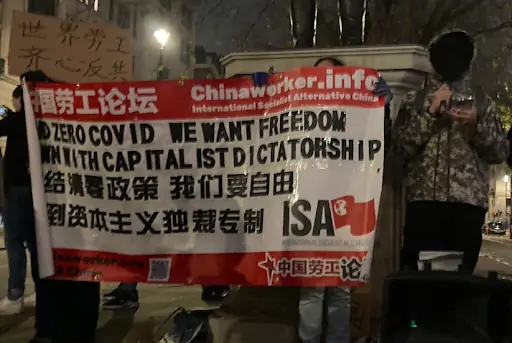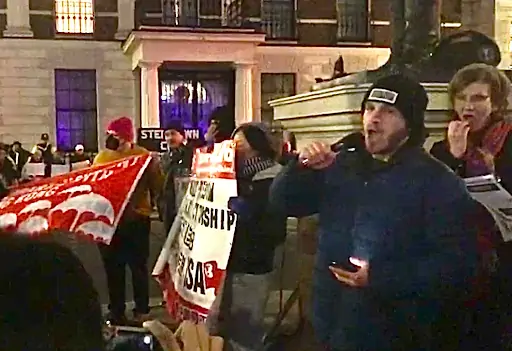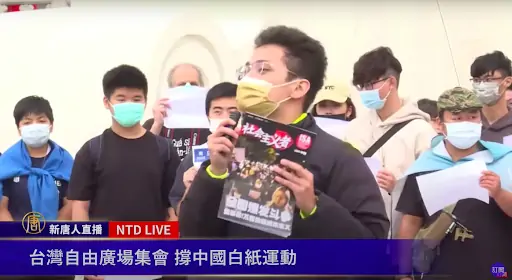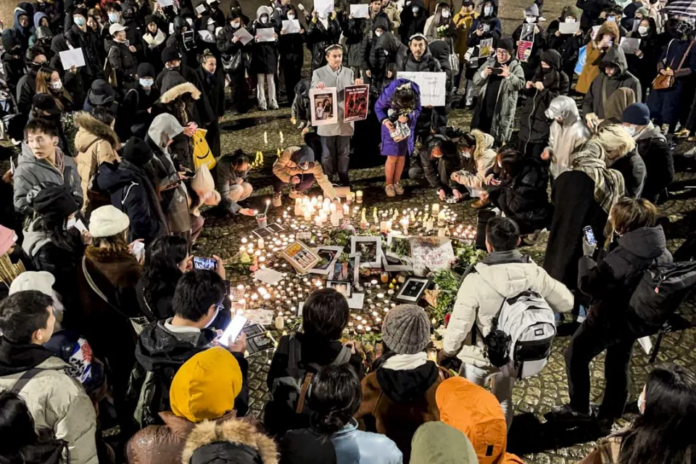Read below for an update on where the movement stands in China, followed by a selection of reports from solidarity demonstrations across the world and ISA’s involvement.
Elan Axelbank, Socialist Alternative (ISA in England, Wales & Scotland)
In late November, China was hit with an unprecedented wave of mass protests in around 20 cities and more than 80 universities. The protests have thrown Xi Jinping’s regime into a state of near panic. For the time being, the Chinese dictatorship (CCP) and its security state seem to have succeeded in stamping out the protests, but Chinese society will not return to how it was before.
In recent years, small, localized protests against lockdowns, pollution, or corruption were not out of the ordinary in China, though they’ve always been heavily censored. What made the recent wave of protests different is that they were national in scope, and in some cases had political demands for democratic rights and against the dictatorship. Protesters called for an end to national policies such as “zero-Covid,” they demanded freedom of speech, press, and assembly, and chants against Xi Jinping and the so-called Communist Party featured in Shanghai and on universities. The airing of such slogans in public has not been heard since the mass movement of 1989. This counts as “subversion of the state” and is punishable by many years in prison.
The downturn in protests, which very well may only be temporary, is partly due to state repression, but also because the working class in China is prevented in every way by the vicious police state and ban on trade unions from organizing. Therefore all struggles tend to be convulsive, spontaneous and unplanned. Strikes in China are rarely organized; more often they “happen” when the brutalization and cheating of workers reaches a breaking point.
The stopping of protests is not universal, however, as recent days have seen multiple migrant worker protests in Guangdong and a protest at Nanjing University. The students in Nanjing protested after the lockdown was lifted at their campus, only to be suddenly reimposed a few days later. This is a process likely to be repeated all over China in the coming months. It is not a question of if the protests will reemerge, but when.
What is Happening to Zero-Covid?
Over the weekend, several of China’s largest cities announced easings of lockdown policy. In some cities, the requirement to present a negative PCR test in order to travel on public transport was scrapped, and in Beijing some apartment complexes indicated residents could quarantine at home instead of the centralized camps (fangcang) which are often described as worse than prison.
It’s notable that Xi Xinping himself has not made any statements regarding zero-Covid or the easing of lockdowns (apart from private comments made to the visiting President of the European Council, Charles Michel), let alone publicly acknowledge that the protests even took place. These changes have been delegated to local officials to protect Xi, who cannot be seen as “going back” on his flagship policy of the last three years, but there is no question they have the dictator’s sanction. While the overseas media is painting these moves as a wholesale retreat from zero-Covid, in reality it is partial, though it may deepen. Currently there are 450 million people living in some form of lockdown in China, down from 528 million one week ago.
Far from representing a “softening” of the dictatorship as a whole, what this change indicates is simply that for Xi, the spreading of Covid — even the potential for hundreds of thousands, or as some experts have indicated, up to two million deaths — is a lesser evil to the most public display of resistance to the regime in 30 years. This shows just how scared and unconfident the regime is, especially as China heads deeper into an economic crisis (Capital Economics predicts real GDP growth of -1% for 2022), and confirms what we said both before and after the CCP’s 20th Party Congress in October: the dictatorship is increasingly acting from a position of weakness, not strength.
The easing of zero-Covid now presents a new set of problems for Chinese society, which clearly underline the limits of “reform” of the authoritarian capitalist system and sharply poses the question of full systemic change. Ordinary people will be immensely relieved to move more freely outside, to ride the subway, to engage in more social activities, though there is also skepticism that announced measures will really be implemented. But with the virus currently surging, vaccines less effective than those in the West which are banned from entering China, extremely low full vaccination rates among seniors (only 40% of those over 80 are fully vaccinated), and a major shortage of ICU beds, it is entirely possible that China could be hit by a major wave of Covid deaths in the winter months like Hong Kong earlier this year. Scientists and Covid experts estimate if zero-Covid is lifted, between 1.5 and 2 million people could die across the country, and some say more.
Without a “plan B,” as the highly-contagious Omicron variant spreads, the regime will violently zig-zag, from lockdowns to partial easing, and back to lockdowns. But in the new period opened up by the recent protests, full and long-lasting lockdowns like in Urumqi, lasting over 100 days, will be more and more difficult for the state to enforce. The students at Nanjing University offer a warning to the regime along these lines, with one student seen yelling at representatives of the university, “If you touch us, you will become the second Foxconn!”
This is why the China/Hong Kong/Taiwan section of International Socialist Alternative has called for, beyond just ending zero-Covid, massive resources to build up and equip the healthcare system, stepping up the vaccination program, especially among the elderly, and immediately ending the ban on foreign mRNA vaccines. The super-profitable pharmaceutical and Covid corporations must be taken into democratic public ownership without compensation, and the massive resources of those companies put into the public hospital system.
The Communist Party, in reality the biggest capitalist regime in the world, however, will never make such moves. These changes would pose a fundamental threat to profit maximization and, in the case of the foreign vaccine ban, would be a humiliating admission of national technological weakness for Xi, who needs to stress national greatness as the New Cold War deepens. Dictatorships are never reformed. The CCP must be overthrown and replaced with a democratic socialist system where the working class controls society and democratic rights are guaranteed to all. Serious change is not possible on the basis of capitalism, which in China and many parts of Asia requires an authoritarian system to secure its rule.
Building the Movement Outside China is Crucial
Fighting back against the brutal exploitation and oppression of Chinese capitalism and its ‘Big Brother’ dictatorship within China is extremely difficult and dangerous, to put it mildly. Immediately following the wave of protests the last weekend of November, the regime sent out mass calls and texts to those who attended the protests — known due to security cameras and their tracking of mobile phones — saying their identity and attendance of the protests is known to the police and warning them to stay away next time. Shortly before the recent wave of protests broke out, ISA in London staged a demonstration in solidarity with jailed socialist activist Chai Xiaoming and for the freeing of all political prisoners in China outside the Chinese Embassy. Just a week later, a protest twenty times the size returned to the same spot.
But speaking out against the dictatorship is not without danger for Chinese citizens living outside China either. There have been numerous accounts of Chinese students studying overseas attending vigils in solidarity with the victims of the Urumqi fire and the recent protests, only to have their family in China then visited at home by police. The dictatorship’s advanced surveillance systems and network of spies and agents both within and outside China is absolutely massive, and reports in recent months have only made this more clear. It is a digital totalitarian state, with the most sophisticated surveillance technology in the world (often developed in partnership with U.S. companies). By definition, a dictatorship needs an intense security state to remain in power.
At many points throughout history, the efforts of socialists and activists living in exile, with the ability to build organizations and more freely write political material which could then be smuggled into their home country, have been central to the toppling of dictatorships. This was certainly the case with the socialist Russian Revolution, led by Lenin and Trotsky who lived in exile for most of their political lives and, to a slightly lesser extent, the ending of apartheid in South Africa.
In just the last six months, with Covid restrictions visibly easing around the world, while they remained in place in China, and now a full-scale economic crisis, a rapid politicization and in some cases radicalization has taken place among Chinese students studying abroad. After Foxconn workers at the largest iPhone factory in the world, fighting back against lockdown, unsafe conditions, and stolen wages kicked off the recent movement, students played a big role in spreading it after the fire in Urumqi. Similarly, the solidarity protests internationally which have taken place over the last week and a half have been driven almost exclusively by Chinese students studying abroad.
International Socialist Alternative are doing everything we can to help develop this movement. This has taken the form of our branches initiating their own protests, like in London, or helping to build, then turning out in support of and speaking at protests, like in Taipei, New York City, Dublin, Boston, and more. Wherever ISA is present, we contribute to the vitally necessary discussion and debate within the movement about the way forward — what sort of demands, organization, and strategy are necessary to win.
China is the second most populous country in the world, the second largest economy in the world, and ruled by the most powerful dictatorship in the world. Its working class is gargantuan and potentially powerful. The New Cold War between Chinese and US imperialism threatens to escalate all crises in every corner of the world in the coming years, including the threat of widening inter-imperialist military conflict. The building of a genuine socialist movement in China is not an option, but a necessity, for the working class internationally, and therefore ISA sees it as a top priority.
London
Over 150 people turned out to a demonstration on December 4th outside the Chinese Embassy in London, initiated by ISA together with student organizations. Nearly fifteen people spoke at the open mic protest, including members and supporters of ISA.

“The regime’s brutal zero-covid policy is really a form of martial law — with on one hand the extreme food shortages, poverty, mental health crisis and unemployment, and on the other the skyrocketing profits of the pharmaceutical companies. Now the CCP is desperate to try and appear like it is opening up, relaxing the zero-COVID policy. Why? Because the united protests of Han, Uighur and other ethnic minorities in Urumqi and elsewhere have struck deep fear inside the dictatorship. In an instant, the decades of racist and nationalist propaganda were swept aside by the united struggle of working class people…”
“The CCP’s system can only survive when we are forced to work for it. Without the working class not a single wheel turns, not a phone rings, not a light bulb shines. Through the actions of millions to strike and demonstrate, we can win the freedom to speech, organize, strike, and vote… We know the struggle needs organization. A successful struggle needs unions and it needs revolutionary parties — that’s the lesson from all democratic revolutions. We want democracy, we want feminism, and this means we want genuine socialism. If you’re interested in those ideas, you can read more about them in our banned underground magazine — the Socialist.”

“China and the West, led by the US, are locked into an existential battle over who will be the biggest global superpower. But the working class doesn’t take a side in imperialist conflict like this… Whether you’re Chinese working class, American working class, or anywhere else — we have to stand together against those who drive us into war, economic crisis, and division along racial, national, or gender lines… That’s why I’m here today. As an American, but more importantly, as a socialist. We oppose the CCP dictatorship — not for nationalist reasons — but because it jails strikers. Because it bans trade unions. All to make billionaires like Elon Musk and multinational corporations like Apple even richer.”
“But this dictatorship isn’t going to overthrow itself. No authoritarian regime in history ever has… Protests will resume. Whether in a week, a month, 6 months, or a year. And when they do — we’re going to need clearer demands, better organization, and a strategy to win… The movement will need independent trade unions, independent student unions. It will need to escalate using workers and student strikes — our most powerful weapon. It will need to develop underground committees to coordinate, strategize, and organize the movement. And it will need discussion and debate on the way forward. International Socialist Alternative is prepared to do all that we can to help this movement win.”
27 attendees bought our hot-off-the-press special edition Chinese-language magazine containing a review of the protests so far and proposals for the movement, as well as broader analysis of Chinese society including the economy, politics, and the class struggle. An additional 8 people bought our English-language magazine, and in total nearly £200 were raised to support the work of our China/Hong Kong/Taiwan section. There are more demonstrations in London this weekend that ISA is mobilizing for.
Taipei
Taiwan has also seen actions in solidarity with the protests across the Strait. Last weekend, 100 people attended a demonstration in Taipei. One ISA member spoke and was interviewed on live national television. ISA was the only left organization putting forward clear demands, and over 30 people bought copies of our Chinese magazine and we raised $3,600 TWD for our work in China/Hong Kong/Taiwan.

New York City
New York City has a large Chinese population. Last weekend, 200 people participated in a solidarity protest in the high-traffic Washington Square Park in Manhattan, which ISA members helped build for and spoke at. Our branch in New York City reports that many attendees had some degree of support for capitalism, as well as US and western imperialism. One of the sponsoring organizations was the Democratic Party of China, a conservative pro-capitalist organization of Chinese people living in the US but with no base inside China.
Despite the varied politics of the protest, especially among the youngest participants and students there was openness to Marxist ideas. ISA was the only socialist organization present, which drew attention to our table and politics, and one ISA member spoke, reading out a statement from a comrade in China. Similar to our involvement at other protests, it was necessary to clarify what we mean by “socialism.” Our socialism has nothing in common with the “Socialism with Chinese Characteristics” (AKA capitalism) of the CCP dictatorship, and is also different from the idea of attempting to “reform” the CCP, for a “lighter” version of dictatorship, which is clearly not the direction the CCP is taking under Xi Jinping. The best way to do this is by elaborating our demands and broader program for Chinese society and the class struggle, which can be read more about on chinaworker.info.
New York City ISA members sold 11 copies of the Chinese magazine, raised $100, and several people expressed interest in getting involved with ISA. This shows that socialists everywhere can help to build this struggle.


Join us!
The above are just a few of the demonstrations ISA has attended since the protests broke out in China and after the coming weekend, the list will more than double.
The CCP dictatorship is in a historic crisis. As the saying goes, every decision they make will be the wrong one, because every “solution” they attempt to enact only creates in turn new crises. The protests have for now subsided, but the chants of “Down with the CCP” and “Xi Xiping! Step down!” cannot be taken back. In preparation for a new wave of protests to emerge, lessons must be learned from struggles against dictatorships throughout history, as well as more recent struggles like the Hong Kong movement of 2019.
Spontaneous protests can burst onto the scene but without clear demands and organization their staying power will always be limited. There must be a clear strategy to win, based on the power of the working class, harnessed into independent trade unions and student unions and exercised through mass, coordinated strikes. Underground committees must be built to coordinate, strategize, and develop the struggle. We must have clarity about the impossibility of reforming the CCP, which far from being “communist” is a capitalist dictatorship, and instead the need to replace this system with a democratic workers’ government and genuine socialism. For all who agree, Chinese or not, living in China or not, join International Socialist Alternative (chinaworker.info in China/Hong Kong/Taiwan) and help us build this historic and necessary struggle.




